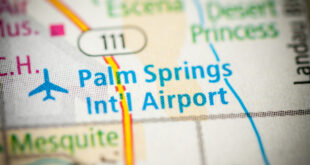City officials hope the project, along with some non-gaming development, turns their downtown into a destination location.
Cathedral City is going to get into the casino business.
In August, the city sold a 12-acre parcel at the northwest corner of East Palm Canyon and Date Palm drives to the Agua Caliente Band of Cahuilla Indians for $5.5 million.
The Palm Springs-based tribe, which owns and operates resort-casinos in Palm Springs and Rancho Mirage, plans to develop its third gaming operation on the long-vacant parcel, said Stone James, Cathedral City’s economic development director.
The two-phase project will start with the casino, which will cover up to 65,000 square feet. The tribe will be allowed to operate up 500 slot machines, a figure based on an agreement tribal officials reached with the state two years ago.
Phase two, which will cover up to 55,000 square feet, may include restaurants and bars, retail, office space and space for some mixed-use projects, according to development plans released in January.
Tribal officials are working with the U.S. Bureau of Indian Affairs, which is part of the U.S. Department of Interior, to convert the Cathedral City property into tribal trust land. By law, that conversion must be completed before a casino may be built there.
Such a change-of-ownership is common among gaming tribes that are looking to expand, and the practice is considered an important part of maintaining tribal autonomy, according to the bureau’s website.
The casino represents a “large-scale investment” by the Agua Caliente tribe in Cathedral City, one that will create jobs and revive an underperforming parcel in the heart of downtown, tribal Chairman Jeff L. Grubbe said in a statement shortly after the land sale was announced.
The planned casino is one of several projects, either completed or being planned, that are part of Cathedral City’s efforts to make its downtown one of the Coachella Valley’s major entertainment and destination locations.
Other downtown revitalization projects include:
- A recent $2 million renovation to the Mary Pickford Theatre, which recently hosted the annual Palm Springs Film Festival
- A planned 2.5-acre amphitheater and park that will be built next to city hall. Construction on that project is expected to start in June
- The relocation of the Coachella Valley Repertory Theater, which will move from Rancho Mirage to the former Desert Imax in Cathedral City at 68510 E. Palm Canyon Drive
Cathedral City officials are also negotiating to bring hotel and mixed-use projects – a potential blend of commercial, office and residential development – to two vacant parcels close to where the casino will be located, James said.
“Not only the casino, but everything we’re doing has the potential to bring more people and more businesses to downtown,” said James, who said the city’s prior set of proposed downtown upgrades was derailed by the economic collapse of 2007 and 2008. “We’re getting a lot of interest from developers who see the potential in what we’re trying to do.”
The city will receive no sales tax revenue from the casino, but it will be compensated by the tribe in two areas: for police, fire and other public services the city will provide to the gaming establishment, and for any revenue the city may lose over time because of the prime piece of downtown real estate it no longer owns because of last summer’s transaction.
Both of those payments are being negotiated, James said.
The Agua Caliente tribe owns multiple parcels throughout the Coachella Valley, some of which are potential commercial development sites, said Kate Anderson, the tribe’s public relations director.
“Our reservation is shaped like a checkerboard, with land all over, which makes it easier for us to develop in different markets,” Anderson said. “But at this point we’re focused exclusively on the Cathedral City property.”
How many jobs the casino might create has not been determined, Anderson said.
A casino’s potential impact on a city’s downtown – particularly how many other businesses it might attract – can be difficult to determine, said I. Nelson Rose, a professor emeritus at Whittier Law School and an expert on international gaming laws and practices.
“If you own a bar or a restaurant, and you’re going to be helped by a casino, then I think you’d better be close to it,” Rose said. “If you’re three or four blocks away, people at the casino aren’t going to patronize you. They’re probably going to stay close to the casino.”
Rose said he recently advised officials in Windsor-Ontario, Canada, that a planned casino would generate some revenue for their city, but not as much as they hoped.
“I told them they would get something out, but that on the overall they would lose money,” Rose said. “From an economic standpoint casinos are a very mixed bag.”
 IE Business Daily Business news for the Inland Empire.
IE Business Daily Business news for the Inland Empire.


